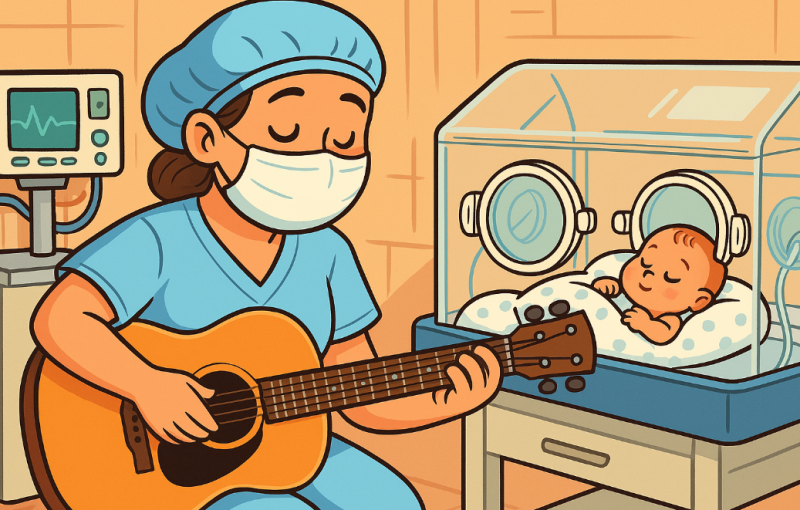
Music Makes Kids Smarter—But Not the Way You Think
by Jon Scaccia April 17, 2025You’re in a hospital’s neonatal unit, and a nurse walks in—not with medication, but with a guitar.
Wait, what?
That’s right. In some hospitals, music isn’t just a background vibe—it’s a full-on therapy. And now, science is catching up to something parents, teachers, and yes, even preschool DJs have long suspected: music might be one of the most powerful tools for childhood development.
A new meta-analysis (a fancy way of saying “study of studies”) just dropped, and it’s got some fascinating findings about how music affects the brains of kids from infants to teens. But here’s the twist—it’s not about turning your toddler into the next Mozart. It’s about how music may shape everything from language skills to IQ.
Let’s break it down like a catchy beat.
So, What Did the Scientists Do?
Researchers combed through thousands of studies on music intervention (a.k.a. letting kids bop, listen, play, or create music under professional guidance) and narrowed it down to just seven high-quality experiments. These involved 337 children, ranging from premature babies to preschoolers.
They weren’t just jamming for fun—each study measured how music affected things like:
- Cognitive abilities (Can the kid think through problems?)
- Language skills (How well do they talk or understand?)
- Motor skills (Are they moving and grooving on track?)
- IQ (Can music actually make them smarter?)
The scientists then compared music intervention groups to kids who didn’t get any musical exposure at all. Spoiler alert: music didn’t work miracles, but it did deliver some pretty awesome benefits.
Surprise! It’s Not All About Cognition
First up, let’s tackle the biggie: Did music make kids smarter overall?
Not exactly—at least not in the way most people think.
Using the Bayley-III, a popular tool to assess infant development, the researchers found no major difference in cognitive abilities between the music group and the non-music group.
Cue the sad trombone.
BUT—before you pack away the ukulele, here’s the twist: music did have strong effects elsewhere. When researchers used different tools, like the Gesell and CSBQ scales, they found significant improvements in:
- 💬 Language development
- 🧠 IQ scores
- 🕺 Motor coordination
In fact, in one study, preschoolers who had regular music lessons saw their IQ scores jump by five points. That’s not nothing.
From Beats to Brain Boosts: Why Music Works
Here’s where it gets cool (and a little bit sci-fi).
When kids listen to or make music, it stimulates the brain like fireworks. We’re talking multiple areas lighting up at once—memory centers, motor pathways, emotional regions, and even the language zones in the left hemisphere.
Think of it like a full-body workout—but for the brain.
🎧 Language Skills:
Singing teaches rhythm and pronunciation. Think about nursery rhymes—they’re practically designed to boost phonemic awareness.
🎹 Motor Skills:
Playing an instrument means tiny fingers moving with precision and timing. Even clapping along to a beat improves coordination.
🧠 IQ & Cognitive Flexibility:
Musical training requires multitasking: reading notes, listening, adjusting rhythm, and sometimes doing it in sync with others. It’s like giving the brain a Rubik’s Cube… and then playing it to a rhythm.
But Why the Mixed Results?
Here’s where the research hits a few sour notes.
While some tests showed major improvements, others didn’t budge at all. Why the inconsistency?
A few reasons:
- Not all music therapy is created equal—some kids listened passively, others actively created.
- Different age groups react differently (a preemie’s brain is not the same as a 5-year-old’s).
- The scales used to measure development varied a lot, and some were more sensitive than others.
In short: the science is still tuning its instruments.
What This Means for You (and Your Little Ones)
Okay, so your kid might not turn into Einstein just by learning “Twinkle, Twinkle”—but there’s still a ton of value in making music part of childhood.
Want your child to develop stronger communication skills? Music helps.
Looking to boost coordination or attention span? Music helps.
Need a non-screen activity that builds brains and bonds? Music really helps.
And here’s the beauty of it: you don’t need a certified therapist to get started.
- Play music while they draw or play.
- Dance around the kitchen together.
- Hand them some pots and wooden spoons and start a jam session.
No, it’s not always peaceful—but it is powerful.
So, Should Music Be Prescribed?
If science had a Spotify Wrapped, music therapy would be in the top five for “most promising interventions.” It’s cheap, fun, and accessible. Best of all? It works even when you’re not trying to make it educational.
So yeah, it might not be a magical brain-boosting pill—but it’s darn close.
Let’s Explore Together 🎶
Now it’s your turn to join the chorus! We want to hear from you:
- 🎵 What’s the most surprising benefit of music you’ve seen in your life or your child’s?
- 🧠 If you could design your own music-based learning program, what would it look like?
- 💡 What’s your all-time favorite brain-boosting song?
Drop a comment, share this blog, or start a living room dance party and tag us. Because when science meets sound, everybody wins.
Leave a Reply